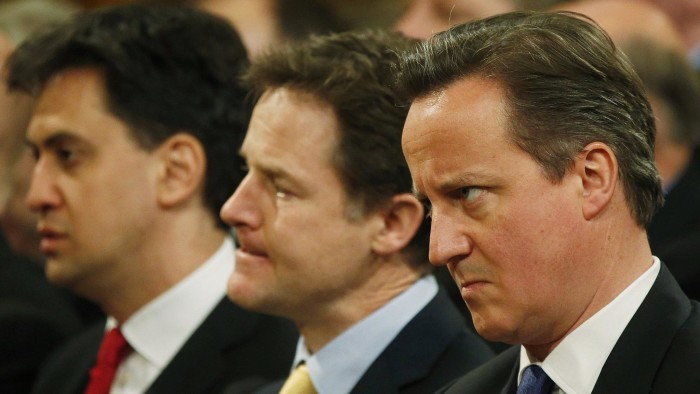Cameron opens a can of worms on constitutional reform

Roula Khalaf, Editor of the FT, selects her favourite stories in this weekly newsletter.
David Cameron emerged from the black door of Downing Street just after 7am on Friday with what looked like a simple proposition: a timetable for agreement on fresh new powers for the Scottish parliament.
But by linking those changes to broader constitutional reforms affecting the whole of the UK, the prime minister opened a can of worms that will have significant constitutional implications well beyond Scotland.
“Just as the people of Scotland will have more powers over their affairs, so it follows that the people of England, Wales and Northern Ireland must have a bigger say over theirs,” he said.
Mr Cameron said that proposals for Scotland would be laid out by November with draft legislation by January, but he glided over the fact that the three main parties still have not agreed exactly what those new tax and spending powers would be.
Neither did he mention that draft legislation presented in January stands almost no chance of being passed into law before Parliament is dissolved on March 30 for the general election.
And after the prime minister stressed the importance of “English votes for English MPs”, it did not take the opposition Labour party long to realise that his statement contained an electoral grenade aimed squarely in its direction. The move could undercut Labour’s political power in Westminster, depending on how much say Scottish politicians were to retain over England’s laws.
The Institute for Government warned that reducing the rights of Scottish MPs could weaken a future Labour prime minister: “In extremis depriving the government of a majority on major areas of English domestic policy such as health and education.”
But Downing St emphasised that it has not yet decided precisely how it intends to address the so-called West Lothian question, first identified in 1977 by the MP for the eponymous constituency, Tam Dalyell.
Lord Smith of Kelvin, who organised the Glasgow Commonwealth Games and is chairman of the power utility SSE, will oversee the process of further Scottish devolution.
William Hague, leader of the House of Commons, will head a cabinet committee to devise a way to limit scrutiny of England-only legislation to MPs with English constituencies.
Mr Hague is likely to consider the work of a recent government-appointed commission chaired by Sir William McKay, which concluded that decisions only affecting England and Wales should need the consent of a majority of MPs for those nations.
But he cautioned that there should be no areas of legislation from which non-English MPs were excluded altogether. One solution could be a public bill committee with a balance of English and Welsh MPs with the power to amend legislation, the commission recommended.
One Tory aide played down the idea of a costly new England-only Parliament, saying that the public had already blown a “raspberry” to Labour’s idea of regional assemblies a decade ago.
Mr Hague’s committee will aim to produce a firm set of recommendations by the start of next year, in tandem with Lord Smith. Labour is likely to try to torpedo or delay the England plan while trying to avoid blame for doing so – a tricky political manoeuvre. Instead it will call for greater powers to be moved from Westminster to English “city regions”.
On Friday Mr Miliband called for a new “Constitutional Convention” to examine alternative ways to devolve power in England. This would only happen in autumn 2015. “My guess is that there will be cross-party support for the Scottish proposals while the English devolution will have to wait rather longer,” said one front-bench Labour MP.
Even then there will be months of political haggling to try to resolve the splits between the three main parties over which further powers to devolve to Scotland.
Nor does the timetable meet demands of the Scottish National Party, which led the independence campaign, for a “second reading” for the new Scottish bill by late March. Instead, the draft legislation would have to be picked up by whoever wins the general election in May.
A spokesman for Nick Clegg, the leader of the Liberal Democrats who are part of the UK’s coalition government, said he was firmly behind Mr Cameron on the issue: “It is not acceptable or sustainable for Labour to say that this can happen imminently and irreversibly without addressing the same issues for England,” he said.
Comments